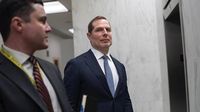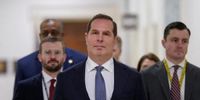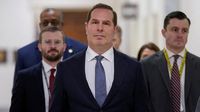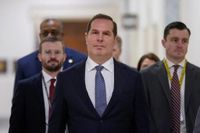In a surprising turn of events, Pete Marocco, a key figure in the Trump administration's efforts to dismantle the U.S. Agency for International Development (USAID), has departed from the State Department after a mere three months in his role. According to a report by the Wall Street Journal on April 13, 2025, Marocco's exit follows conflicts with Secretary of State Marco Rubio over the future of foreign aid.
Marocco's tenure was marked by a significant reduction in U.S. foreign aid programs, during which he oversaw the closure of 83 percent of USAID’s operations. Appointed head of the Inter-American Foundation (IAF), Marocco was initially tasked with conducting an exhaustive review of foreign assistance spending. A senior administration official remarked, “Pete was brought to State with a big mission - to conduct an exhaustive review of every dollar spent on foreign assistance. He conducted that historic task and exposed egregious abuses of taxpayer dollars.”
However, internal tensions escalated as Marocco favored more extensive cuts to foreign aid, while Rubio advocated for maintaining essential services. This clash culminated in Marocco's departure, which some sources suggest was not entirely voluntary. Reports indicate that he learned of his exit from the State Department last week, raising questions about the circumstances surrounding his departure.
Marocco's brief return to the State Department as the director of foreign assistance came less than a month ago, after he had previously served as deputy administrator of USAID. In an email to his staff, he stated, “I am going to return to my post as the Director of Foreign Assistance to bring value back to the American people.” Yet, his ambitious plans were cut short amid ongoing disputes over the direction of U.S. foreign aid.
Hawaiian Democratic Senator Brian Schatz criticized Marocco's management, stating, “Marocco's tenure brought chaos to USAID, reckless and unlawful policy to the State Department, and dismantled long-standing U.S. foreign policy.” His approach to foreign aid drew further scrutiny, especially following a federal judge's ruling on April 4, 2025, which determined that the Trump administration lacked the authority to dismantle the IAF and remove its president, Sara Aviel.
Judge Loren AliKhan noted, “Because neither President Trump nor Mr. Marocco had the authority to fire her from her position as the president of the IAF, Ms. Aviel is likely to succeed on the merits of her case.” This ruling underscored the legal complications surrounding Marocco's initiatives and the broader implications of the administration's foreign aid policies.
In a closed-door meeting with lawmakers in March, Marocco described USAID as a “money-laundering scheme” and questioned the constitutionality of foreign assistance. His remarks reflected a controversial stance that resonated with some far-right factions, particularly regarding the agency's alleged promotion of LGBTQ issues and its role in international political movements.
Marocco's collaboration with Elon Musk's Department of Government Efficiency (DOGE) was instrumental in implementing drastic cuts to USAID, which has seen approximately 90 percent of its foreign contracts slashed. The DOGE's actions have been characterized as a crusade against perceived wasteful spending within the federal bureaucracy, but critics argue that these cuts jeopardize vital humanitarian efforts.
As part of the administration's shifting priorities, the Trump administration recently moved to reinstate several foreign aid programs that had been previously canceled, including emergency food assistance initiatives. This reversal illustrates the ongoing turbulence within the administration's approach to foreign aid, which has been criticized for its inconsistency and lack of strategic direction.
In the wake of Marocco's departure, the future of U.S. foreign assistance remains uncertain. The administration's fluctuating stance has raised concerns among lawmakers and advocacy groups about the potential impact on vulnerable populations worldwide. Congressional Democrats have expressed alarm over the unilateral dismantling of the IAF, arguing that only an act of Congress can dissolve such an agency.
As the dust settles on Marocco's tumultuous tenure, it is clear that his departure marks a significant moment in the ongoing debate over U.S. foreign aid policy. With tensions still simmering between factions within the administration, the direction of future assistance efforts will likely continue to be a contentious issue.
While Marocco's next steps remain unclear, the fallout from his brief but impactful role at the State Department will resonate as the administration grapples with its foreign aid strategy moving forward. As the political landscape shifts, stakeholders will be watching closely to see how these developments unfold.







